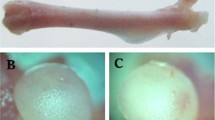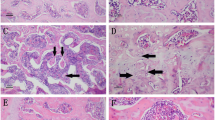Abstract
Purpose
Pentoxifylline (PTX) is a derivative of methylxanthine and is used in peripheral vascular and cerebrovascular diseases for its effect on the regulation of blood circulation. We investigated whether PTX could be beneficial for femoral head osteonecrosis associated with steroid through these effects.
Methods
Sixty mature Leghorn type chickens were chosen and divided into three groups. The 25 chickens in group A were given a weekly dose of 3 mg/kg/week methylprednisolone acetate intramuscularly. Four chickens in group B died after the first drug injection and were excluded from the study. Therefore, the remaining 21 chickens in group B were additionally given 25 mg/kg/day pentoxifylline intramuscularly, along with the steroid medication as given in group A. The ten chickens in group C were not given any injections, as they were accepted as the control group. After the sacrifice of the animals at week 14, both femoral heads were taken from each animal. The animals which died along the course of the study also underwent pathological examination but were not a part of the statistical analysis.
Results
In this study, steroid induced femoral head osteonecrosis has been experimentally observed in chickens after high doses of corticosteroid therapy. The chickens were given pentoxifylline in order to prevent the effects of steroid on bones and bone marrow. The results showed that chickens are suitable osteonecrosis models, and that steroid causes adipogenesis and necrosis in the bone marrow and the death of the subchondral bone.
Conclusions
The results of this study hint at the assumption that PTX may have a positive benefit on ONFH. PTX seems to minimise the effects of the steroid and reduce the incidence of ONFH.



Similar content being viewed by others
References
Lieberman JR, Roth KM, Elsissy P et al (2008) Symptomatic osteonecrosis of the hip and knee after cardiac transplantation. J Arthroplasty 23(1):90–96
Shibatani M, Fujioka M, Arai Y et al (2008) Degree of corticosteroid treatment within the first 2 months of renal transplantation has a strong influence on the incidence of osteonecrosis of the femoral head. Acta Orthop 79(5):631–636
Nagasawa K, Tada Y, Koarada S et al (2005) Very early development of steroid-associated osteonecrosis of femoral head in systemic lupus erythematosus: prospective study by MRI. Lupus 14(5):385–390
Weinstein RS (2011) Glucocorticoid-induced osteonecrosis. Endocrine Dec 15. [Epub ahead of print]
Kerachian MA, Séguin C, Harvey EJ (2009) Glucocorticoids in osteonecrosis of the femoral head: a new understanding of the mechanisms of action. J Steroid Biochem Mol Biol 114(3–5):121–128
Fisher DE (1978) The role of fat embolism in the etiology of corticosteroid-induced avascular necrosis: clinical and experimental results. Clin Orthop Relat Res 130:68–80
Jones LC, Hungerford DS (1984) Models of ischemic necrosis of bone. In: Arlet J, Ficat RP, Hungerford DS (eds) Bone circulation. Williams and Wilkins, Baltimore, pp 30–34
Kawai K, Maruno H, Hirohata K (1983) Fat necrosis of osteocytes as a causative factor in idiopathic osteonecrosis of the femoral head in man. Trans Orthop Res Soc 8:263
Wang GJ, Sweet DE, Reger SI et al (1977) Fatcell changes as a mechanism of avascular necrosis of the femoral head in cortisone-treated rabbits. J Bone Joint Surg 59A:729–735
Wang GJ (1992) Pathogenesis of steroid-induced avascular necrosis and its response to lipid clearing agent. In: Hirohata K, Mizuno K, Matsubara T (eds) Trends in research and treatment of joint diseases. Springer-Verlag, Tokyo, pp 59–71
Wang GJ, Cui Q, Balian G (2000) The Nicolas Andry award. The pathogenesis and prevention of steroid induced osteonecrosis. Clin Orthop Relat Res 370:295–310
Wang GJ, Dughman SS, Reger SI (1984) Femoral head blood flow in long- term steroid treatment (study of rabbit model). In: Arlet J, Ficat RP, Hungerford DS (eds) Bone circulation. Williams and Wilkins, Baltimore, pp 35–37
Pengde K, Fuxing P, Bin S et al (2008) Lovastatin inhibits adipogenesis and prevents osteonecrosis in steroid-treated rabbits. Joint Bone Spine 75(6):696–701
Kabata T, Kubo T, Matsumoto T et al (2005) Onset of steroid-induced osteonecrosis in rabbits and its relationship to hyperlipaemia and increased free fatty acids. Rheumatology 44(10):1233–1237
Cui Q, Wang GJ, Su CC et al (1997) The Otto Aufranc award. Lovastatin prevents steroid induced adipogenesis and osteonecrosis. Clin Orthop Relat Res 344:8–19
Pritchett JW (2001) Statin therapy decreases the risk of osteonecrosis in patients with receiving steroids. Clin Orthop Relat Res 386:173–178
Wang GJ, Moga DB, Richemer WG et al (1978) Cortisone induced bone changes and its response to lipid clearing agents. Clin Orthop Relat Res 130:81–85
Kang P, Gao H, Pei F et al (2010) Effects of an anticoagulant and a lipid-lowering agent on the prevention of steroid-induced osteonecrosis in rabbits. Int J Exp Pathol 91(3):235–243
Motomura G, Yamamoto T, Miyanishi K et al (2008) Risk factors for developing osteonecrosis after prophylaxis in steroid-treated rabbits. J Rheumatol 35(12):2391–2394
Nishida K, Yamamoto T, Motomura G et al (2008) Pitavastatin may reduce risk of steroid-induced osteonecrosis in rabbits: a preliminary histological study. Clin Orthop Relat Res 466(5):1054–1058
Calder JD, Buttery L, Revell PA et al (2004) Apoptosis—a significant cause of bone cell death in osteonecrosis of the femoral head. J Bone Joint Surg Br 86(8):1209–1213
Calder JD, Buttery L, Revell PA et al (2000) Apoptosis of osteocytes in glucocorticoid-induced osteonecrosis of the hip. J Clin Endocrinol Metab 85(8):2907–2912
Zalavras C, Shah S, Birnbaum MJ et al (2003) Role of apoptosis in glucocorticoid-induced osteoporosis and osteonecrosis. Crit Rev Eukaryot Gene Expr 13(2–4):221–235
Ward A, Clissold SP (1987) Pentoxifylline: a review of its pharmacodynamic and pharmacokinetic properties and its therapeutic efficacy. Drugs 34:50–97
Zhang M, Xu YJ, Mengi SA et al (2004) Therapeutic potentials of pentoxifylline for treatment of cardiovascular diseases. Exp Clin Cardiol 9(2):103–111
Schwarz EM, Benz EB, Lu AP et al (2000) Quantitative small-animal surrogate to evaluate drug efficacy in preventing wear debris-induced osteolysis. J Orthop Res 18(6):849–855
Horiuchi H, Saito N, Kinoshita T et al (2001) Enhancement of bone morphogenetic protein-2-induced new bone formation in mice by the phosphodiesterase inhibitor pentoxifylline. Bone 28(3):290–294
Rawadi G, Ferrer C, Spinella-Jaegle S et al (2001) 1-(5-oxohexyl)-3,7-dimethylxanthine, a phosphodiesterase inhibitor, activates MAPK cascades and promotes osteoblast differentiation by a mechanism independent of PKA activation (pentoxifylline promotes osteoblast differentiation). Endocrinology 142(11):4673–4682
Kinoshita T, Ebara S, Kamimura M et al (2000) Phosphodiesterase inhibitors, Pentoxifylline and Rolipam, increase bone mass by promoting bone formation in normal mice. Bone 27:811–817
Horiuchi H, Saito N, Kinoshita T et al (2004) Enhancement of recombinant human bone morphogenetic protein-2 (rhBMP-2)-induced new bone formation by concurrent treatment with parathyroid hormone and a phosphodiesterase inhibitor, pentoxifylline. J Bone Miner Metab 22(4):329–334
Pateder DB, Sheu TJ, O'Keefe RJ et al (2002) Role of pentoxifylline in preventing radiation damage to epiphyseal growth plate chondrocytes. Radiat Res 157(1):6
Epstein MS, Wicknick FW, Epstein JB et al (2010) Management of bisphosphonate-associated osteonecrosis: pentoxifylline and tocopherol in addition to antimicrobial therapy. An initial case series. Oral Surg Oral Med Oral Pathol Oral Radiol Endod 110(5):593–596
Matsui M, Saito S, Ohzono K et al (1992) Experimental steroid-induced osteonecrosis in adult rabbits with hypersensitivity vasculitis. Clin Orthop Relat Res 277:61–72
Gao YS, Zhang CQ (2010) Cytotherapy of osteonecrosis of the femoral head: a mini review. Int Orthop 34(6):779–782
Jäger M, Zilkens C, Bittersohl B et al (2011) Efficiency of iloprost treatment for osseous malperfusion. Int Orthop 35(5):761–765
Jäger M, Zilkens C, Westhoff B et al (2009) Efficiency of iloprost treatment for chemotherapy-associated osteonecrosis after childhood cancer. Anticancer Res 29(8):3433–3440
Petje G, Radler C, Aigner N et al (2004) Pharmacological management of aseptic osteonecrosis in children. Expert Opin Pharmacother 5(7):1455–1462
Yoshioka T, Mishima H, Akaogi H et al (2011) Concentrated autologous bone marrow aspirate transplantation treatment for corticosteroid-induced osteonecrosis of the femoral head in systemic lupus erythematosus. Int Orthop 35(6):823–829
Gangji V, Hauzeur JP (2005) Treatment of osteonecrosis of the femoral head with implantation of autologous bone-marrow cells. Surgical technique. J Bone Joint Surg Am 87 Suppl 1(Pt 1):106–112
Motomura G, Yamamoto T, Irisa T et al (2008) Dose effects of corticosteroids on the development of osteonecrosis in rabbits. J Rheumatol 35(12):2395–2399
Wu X, Yang S, Duan D et al (2008) Experimental osteonecrosis induced by a combination of low-dose lipopolysaccharide and high-dose methylprednisolone in rabbits. Joint Bone Spine 75(5):573–578
Kuribayashi M, Fujioka M, Takahashi KA et al (2010) Vitamin E prevents steroid-induced osteonecrosis in rabbits. Acta Orthop 81(1):154–160
Li Y, Han R, Geng C et al (2009) A new osteonecrosis animal model of the femoral head induced by microwave heating and repaired with tissue engineered bone. Int Orthop 33(2):573–580
Tang TT, Lu B, Yue B et al (2007) Treatment of osteonecrosis of the femoral head with hBMP-2-gene-modified tissue-engineered bone in goats. J Bone Joint Surg Br 89(1):127–129
Sounes J, Griffin M, Malslen C et al (1996) Evidence that cyclic AMP phosphodiesterase inhibitors suppress TNF α generation from human monocytes by interaction with a low-affinity phosphodiesterase 4 conformer. Br J Pharmacol 118:649–658
Badger AM, Olivera DL, Eser KM (1994) Beneficial effects of the phosphodiesterase inhibitors BRL 61063, pentoxifylline, and rolipram in a murine model of endotoxin shock. Circ Shock 44:188–195
Sensky PL, Prise VE, Ward AE et al (1993) The effects of pentoxifylline on the relative perfusion of tumours growing in three sites in the mouse. Br J Cancer 68(6):1110–1114
Hashimato J, Takaoka K, Yoshikawa H et al (1991) Preservation of ectopically induced bone in the mouse by estradiol. Bone 12:249–255
Shimizu T, Mehdi R, Yoshimura Y et al (1991) Sequential expression of bone morphogenetic protein, tumor necrosis factor, and their receptors in bone-forming reaction after mouse femoral marrow ablation. Bone 23:127–133
Zhou FH, Foster BK, Zhou XF et al (2006) TNF-alpha mediates p38 MAP kinase activation and negatively regulates bone formation at the injured growth plate in rats. J Bone Miner Res 21(7):1075–1088
Boguslawski G, Hale LV, Yu XP et al (2000) Activation of osteocalcin transcription involves interaction of protein kinase A and protein kinase C dependent pathways. J Biol Chem 275:999–1000
Declaration of interest
The authors report no conflicts of interest. The authors alone are responsible for the content and writing of the paper.
Author information
Authors and Affiliations
Corresponding author
Rights and permissions
About this article
Cite this article
Erken, H.Y., Ofluoglu, O., Aktas, M. et al. Effect of pentoxifylline on histopathological changes in steroid-induced osteonecrosis of femoral head: experimental study in chicken. International Orthopaedics (SICOT) 36, 1523–1528 (2012). https://doi.org/10.1007/s00264-012-1497-6
Received:
Accepted:
Published:
Issue Date:
DOI: https://doi.org/10.1007/s00264-012-1497-6




